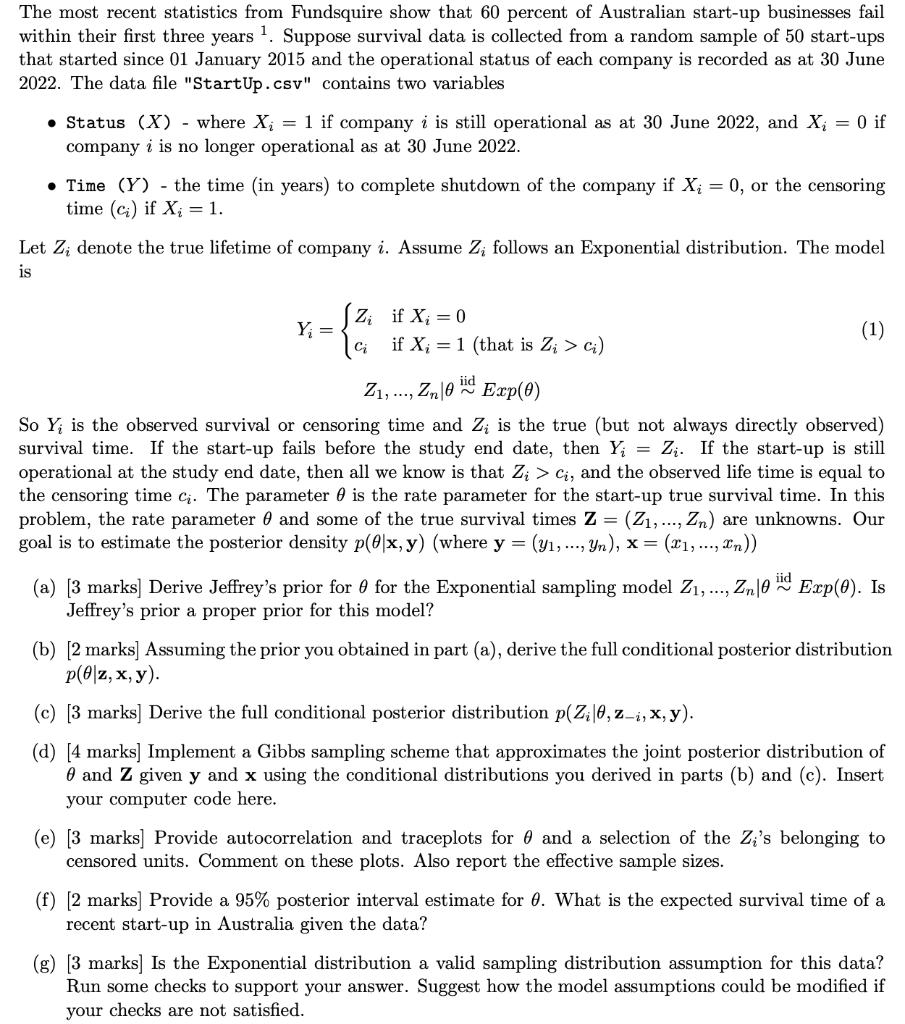Answered step by step
Verified Expert Solution
Question
1 Approved Answer
Status Time 0 2.05 0 2.27 0 2.76 0 2.09 1 4.67 0 3.11 1 1.58 0 2.32 0 1.22 0 1.55 0 1.1 1

Status | Time |
0 | 2.05 |
0 | 2.27 |
0 | 2.76 |
0 | 2.09 |
1 | 4.67 |
0 | 3.11 |
1 | 1.58 |
0 | 2.32 |
0 | 1.22 |
0 | 1.55 |
0 | 1.1 |
1 | 0.29 |
0 | 3.08 |
0 | 1.32 |
1 | 1 |
0 | 0.84 |
1 | 5.18 |
0 | 1.7 |
0 | 1.91 |
1 | 2.59 |
1 | 2.06 |
0 | 2.18 |
0 | 0.57 |
0 | 1.57 |
0 | 0.75 |
1 | 5.23 |
0 | 1.78 |
0 | 1.84 |
1 | 1.63 |
0 | 6.92 |
1 | 2.31 |
0 | 0.88 |
0 | 0.73 |
0 | 1.75 |
0 | 0.76 |
0 | 2.12 |
0 | 4.89 |
1 | 1.87 |
0 | 0.88 |
0 | 2.89 |
1 | 2.84 |
1 | 0.47 |
0 | 1.17 |
1 | 1.42 |
0 | 2.48 |
0 | 2.69 |
0 | 1.65 |
0 | 3.33 |
0 | 0.5 |
1 | 5.79 |
The most recent statistics from Fundsquire show that 60 percent of Australian start-up businesses fail within their first three years . Suppose survival data is collected from a random sample of 50 start-ups that started since 01 January 2015 and the operational status of each company is recorded as at 30 June 2022. The data file "StartUp.csv" contains two variables Status (X) - where X = 1 if company i is still operational as at 30 June 2022, and X = 0 if company i is no longer operational as at 30 June 2022. Time (Y) - the time (in years) to complete shutdown of the company if X; = 0, or the censoring time (c) if X = 1. Let Z, denote the true lifetime of company i. Assume Z; follows an Exponential distribution. The model is Y = Z Ci if Xi = 0 if X, = 1 (that is Z > C) iid Z1, ..., | = Exp(0) (1) So Y is the observed survival or censoring time and Z is the true (but not always directly observed) survival time. If the start-up fails before the study end date, then Y = Z. If the start-up is still operational at the study end date, then all we know is that Zi > Ci, and the observed life time is equal to the censoring time c. The parameter is the rate parameter for the start-up true survival time. In this problem, the rate parameter and some of the true survival times Z = (Z,..., Zn) are unknowns. Our goal is to estimate the posterior density p(0|x, y) (where y = (y, yn), x = (x1, ..., En)) (a) [3 marks] Derive Jeffrey's prior for for the Exponential sampling model Z, ..., Zn|0 id Exp(0). Is Jeffrey's prior a proper prior for this model? (b) [2 marks] Assuming the prior you obtained in part (a), derive the full conditional posterior distribution p(0|z, x, y). (c) [3 marks] Derive the full conditional posterior distribution p(Z;0, z-i, x, y). (d) [4 marks] Implement a Gibbs sampling scheme that approximates the joint posterior distribution of and Z given y and x using the conditional distributions you derived in parts (b) and (c). Insert your computer code here. (e) [3 marks] Provide autocorrelation and traceplots for and a selection of the Zi's belonging to censored units. Comment on these plots. Also report the effective sample sizes. (f) [2 marks] Provide a 95% posterior interval estimate for 0. What is the expected survival time of a recent start-up in Australia given the data? (g) [3 marks] Is the Exponential distribution a valid sampling distribution assumption for this data? Run some checks to support your answer. Suggest how the model assumptions could be modified if your checks are not satisfied.
Step by Step Solution
★★★★★
3.42 Rating (155 Votes )
There are 3 Steps involved in it
Step: 1
Data Background The dataset at hand comprises a representative sample of 50 startups initiated since ...
Get Instant Access to Expert-Tailored Solutions
See step-by-step solutions with expert insights and AI powered tools for academic success
Step: 2

Step: 3

Ace Your Homework with AI
Get the answers you need in no time with our AI-driven, step-by-step assistance
Get Started


